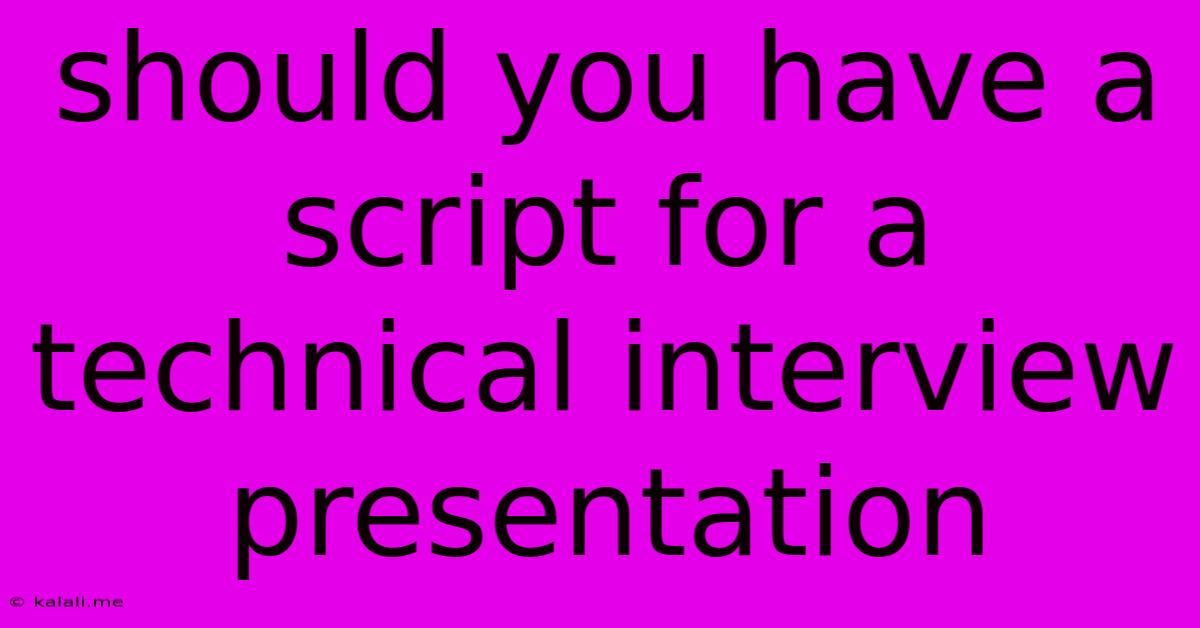Should You Have A Script For A Technical Interview Presentation
Kalali
May 30, 2025 · 3 min read

Table of Contents
Should You Have a Script for a Technical Interview Presentation?
Meta Description: Preparing for a technical interview presentation? This article explores the pros and cons of using a script, offering advice on striking the right balance between preparation and natural delivery for a successful interview.
Landing a technical interview is a significant achievement, but the presentation component can be nerve-wracking. Many candidates grapple with the question: should I use a script? The answer, as with most things in life, is nuanced. It's not a simple yes or no. The optimal approach depends on several factors, including your experience level, the specific presentation requirements, and your personal communication style.
The Case for Using a Script (or at Least, Detailed Notes)
A well-structured script or detailed notes offer several compelling advantages:
- Reduces Anxiety: Knowing you have a roadmap reduces the fear of forgetting key points or stumbling over explanations. This allows you to focus on delivering your message clearly and confidently, rather than battling memory lapses.
- Ensures Thorough Coverage: A script helps ensure you address all critical aspects of the project or topic, avoiding omissions that could leave the interviewer with unanswered questions. This is particularly important when demonstrating complex technical concepts.
- Maintains Structure and Flow: A well-crafted script allows you to present information logically and cohesively, making it easier for the interviewer to follow your train of thought. A clear structure showcases your organizational and problem-solving skills.
- Facilitates Precise Language: Technical presentations require precision. A script enables you to carefully choose your words to accurately convey complex information, avoiding ambiguity or misinterpretations. This is crucial for conveying your technical proficiency.
- Improved Time Management: Knowing exactly what you'll cover and how long each section will take helps you manage your time effectively, ensuring you cover everything within the allotted timeframe.
The Case Against a Word-for-Word Script
While a script offers benefits, relying too heavily on a word-for-word script can be detrimental:
- Sounds Unnatural: Reading directly from a script often results in a stilted and unnatural delivery, which can negatively impact your connection with the interviewer. It may make you appear less engaging and less confident.
- Limits Flexibility and Spontaneity: Sticking rigidly to a script prevents you from responding effectively to questions or adapting your presentation based on the interviewer's reactions. This limits your ability to showcase your problem-solving skills in real-time.
- Hinders Natural Conversational Flow: A script can hinder the natural flow of conversation, making it difficult to engage in meaningful dialogue with the interviewer. Technical interviews are often as much about conversation as they are about presentation.
- Potential for Technical Difficulties: If you lose your place in your script or experience technical issues, it can derail the entire presentation.
- Over-Reliance on Memorization: Rather than understanding the concepts deeply, you might focus on rote memorization, hindering your ability to answer unexpected questions.
Finding the Sweet Spot: The Best Approach
The ideal solution lies in finding a balance. Instead of a rigid script, consider creating:
- Detailed Outline: Structure your presentation with key points and sub-points, focusing on the core message and flow.
- Bullet Points: Use bullet points to guide you through each section, allowing for more flexibility and natural conversation.
- Key Phrases and Keywords: Prepare key phrases and keywords to help you remember crucial information, but avoid writing full sentences.
- Practice, Practice, Practice: Rehearse your presentation multiple times, using your outline or bullet points as a guide. This will help you internalize the information and deliver it confidently.
By striking this balance, you can leverage the benefits of preparation without sacrificing the natural flow and engagement crucial for a successful technical interview presentation. Remember, the goal is to showcase your technical expertise and communication skills – a well-structured approach, rather than a rigid script, will help you achieve this.
Latest Posts
Latest Posts
-
How Do You Juice A Lemon Without A Juicer
May 31, 2025
-
6 Mm Drill Bit To Inches
May 31, 2025
-
When To Use Doch Mall Or Bitte In German
May 31, 2025
-
Scriptures On The Mind Of Christ
May 31, 2025
-
What Is The Green Lanterns Weakness
May 31, 2025
Related Post
Thank you for visiting our website which covers about Should You Have A Script For A Technical Interview Presentation . We hope the information provided has been useful to you. Feel free to contact us if you have any questions or need further assistance. See you next time and don't miss to bookmark.